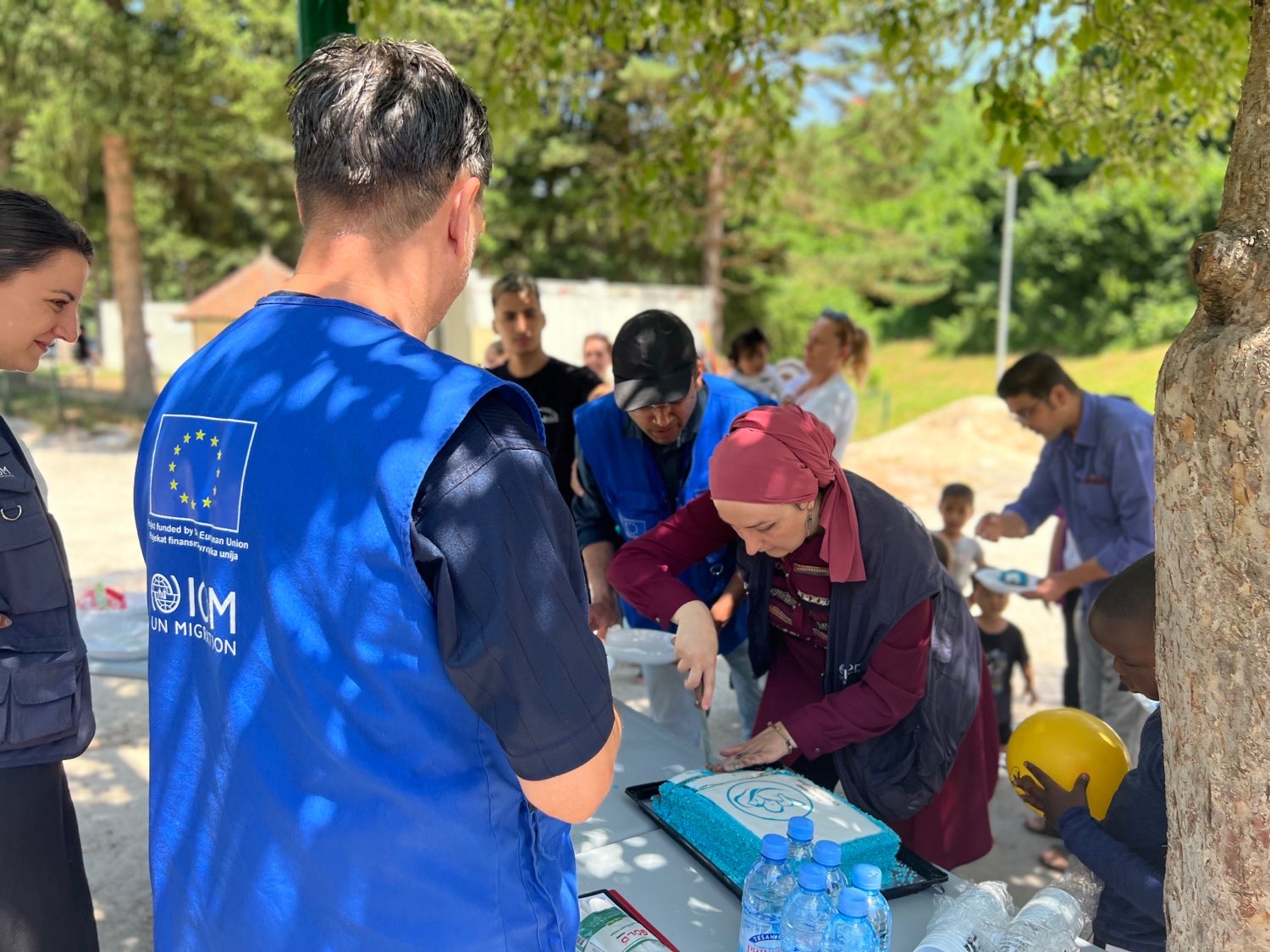-
Who We Are
WHO WE AREThe International Organization for Migration (IOM) is part of the United Nations System as the leading inter-governmental organization promoting humane and orderly migration for the benefit of all. IOM has had a presence in Bosnia and Herzegovina since 1992.
About
About
IOM Global
IOM Global
-
Our Work
Our WorkAs the leading inter-governmental organization promoting since 1951 humane and orderly migration, IOM plays a key role to support the achievement of the 2030 Agenda through different areas of intervention that connect both humanitarian assistance and sustainable development. Across Bosnia and Herzegovina (BH), IOM aims to prevent irregular migration, stop the trafficking of human beings, contribute to national development, and assist the BH Government to manage migration activities.
Cross-cutting (Global)
Cross-cutting (Global)
- Data and Resources
- Take Action
- 2030 Agenda
Mother Baby Wash Unit celebrates one year of supporting migrant mothers and children
Meen But from Pakistan is the mother of two minor children, a boy, and a girl. She has been in BiH for four years. Since the beginning of December, her temporary home on the way to the European Union has been the Ušivak Temporary Reception Centre, in Sarajevo Canton. Although it is a temporary reception center, accommodating many people, she says she feels almost at home. She has everything she needs to raise her children and take care of them, a laundry, ironing area, but also a living room, a corner with a lot of toys for her children. The Mother and Baby Wash Unit is a dedicated space within the Ušivak Centre in which her children have only one concern - which toy to choose.
“Everything is OK. I have everything here for the baby. I am good here, I feel good,” says But.
Her children were born in BiH, and she divorced on the move. Her husband was deported. She is a single mother now, but she lacks nothing to meet her basic needs.
“This is very, very good for us. I wash something here every day,” adds But.
In addition to the playroom, washing, drying, and ironing area, there is always food and clothes available for her babies.
While But talks to us, Mother and Baby Wash focal point Ernada Avdibegovic plays with the children. Her task is to give everyone the necessary care and assist mothers while bathing their children. She often plays with the youngest beneficiaries at the Centre.
“I am here to help the children and mothers spend their time outside their rooms through some different creative activities. I help them with maintaining personal hygiene, which is still really important, but was crucial during the peak of the COVID 19 pandemic, so this area is something really important for many people, and especially children,” explains Avdibegovic.
“Sometimes mothers and children come here asking for food, and in this space we can offer baby food and clothes. We provide complete care from our side. They have everything they need in here. It is warm and clean. Besides IOM employees, the beneficiaries themselves are making sure everything here is disinfected and clean. This is the best area that can be found in the Centre,” believes Avdibegovic.
Jasmina Kovacevic, CCCM Assistant explains that the idea for the establishment of this area was born amid the COVID-19 pandemic, with beneficiaries addressing the Centre’s Migrants Council and expressing their need for a space that would respond to the needs of mothers with children.
“The common space is intended for families with children, mostly pregnant women, mothers with children, but also single fathers with children up to 13 years of age during special time slots. Teenage girls and single women who are staying here can also access the area during the allocated time slots,” says Kovacevic.
The laundry space, where parents and children can take care of their hygiene, consists of two washers, two dryers, laundry baskets, irons, ironing tables, and shelves for folding and storing laundry.
“The personal hygiene zone is equipped with two shower cabins, baby wash basin, two children’s baths and changing tables, and a restroom for people with disabilities,” adds Kovacevic.
A special comfort and atmosphere is provided to beneficiairies in the lounge area furnished with a couch, tables, chairs, baby beds, shelves, and TV.
“We have 70 to 100 people here on average, including mothers with children,” says Kovacevic.
The access and use of these facilities is supervised by IOM staff, in accordance with the IOM MBWU House Rules. Since the opening of the MBWU, almost exactly one year ago, the facility has been used over 4083 times.
The corner for mothers and babies is a modern, clean, and versatile space. There, beneficiaries can enjoy everything that a real and safe home has and, for a moment, leave their worries outside.
The MBWU has been established with the help of the European Union within the project "Addressing COVID-19 Challenges within the Migrants and Refugees Response in the Western Balkans" funded through the EU Foreign Policy Instrument Contributing to Stability and Peace (FPI) and implemented by the International Organization for Migration (IOM) and the United Nations High Commissioner for Refugees (UNHCR).
